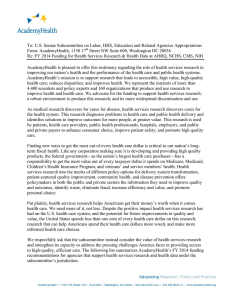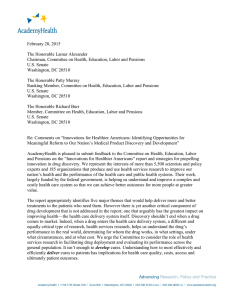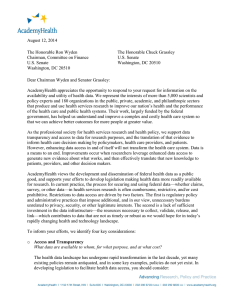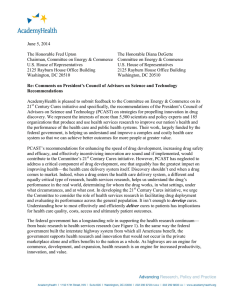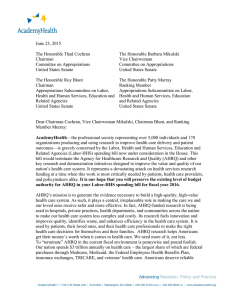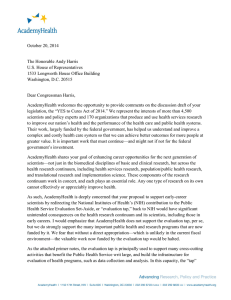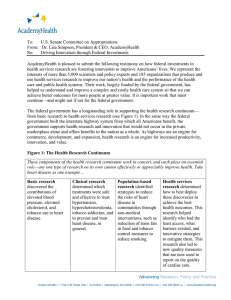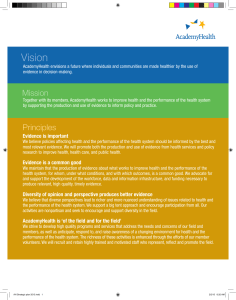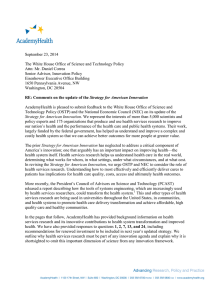To: U.S. House Subcommittee on Labor, HHS, Education and Related... From: Dr. Lisa Simpson, President & CEO, AcademyHealth
advertisement
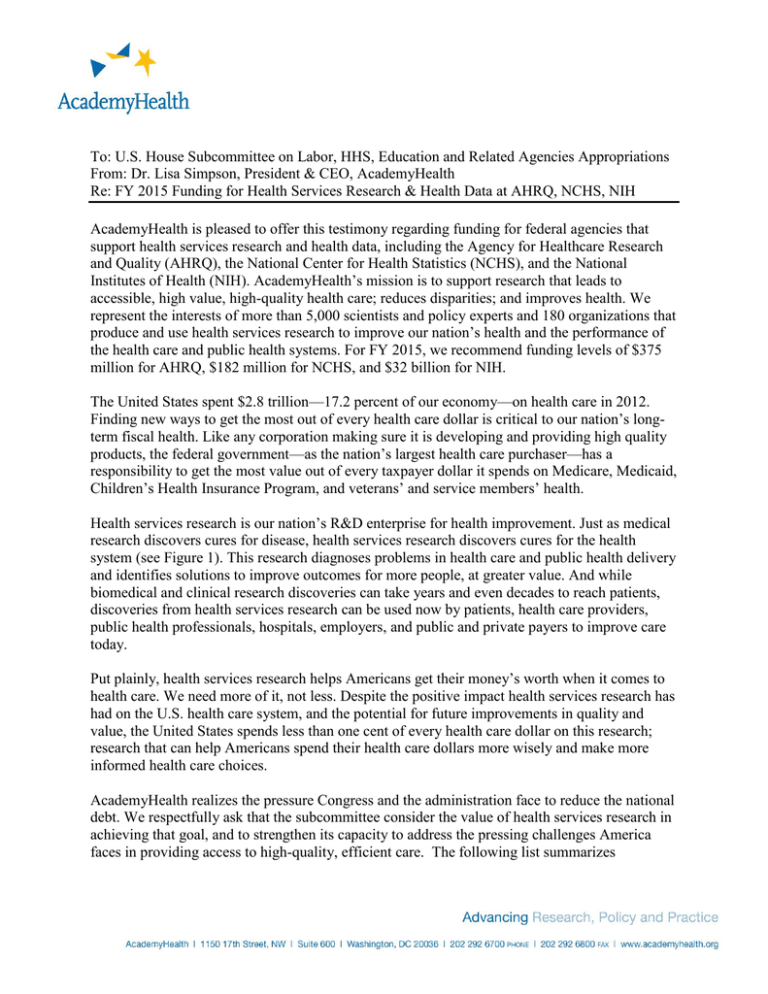
To: U.S. House Subcommittee on Labor, HHS, Education and Related Agencies Appropriations From: Dr. Lisa Simpson, President & CEO, AcademyHealth Re: FY 2015 Funding for Health Services Research & Health Data at AHRQ, NCHS, NIH AcademyHealth is pleased to offer this testimony regarding funding for federal agencies that support health services research and health data, including the Agency for Healthcare Research and Quality (AHRQ), the National Center for Health Statistics (NCHS), and the National Institutes of Health (NIH). AcademyHealth’s mission is to support research that leads to accessible, high value, high-quality health care; reduces disparities; and improves health. We represent the interests of more than 5,000 scientists and policy experts and 180 organizations that produce and use health services research to improve our nation’s health and the performance of the health care and public health systems. For FY 2015, we recommend funding levels of $375 million for AHRQ, $182 million for NCHS, and $32 billion for NIH. The United States spent $2.8 trillion—17.2 percent of our economy—on health care in 2012. Finding new ways to get the most out of every health care dollar is critical to our nation’s longterm fiscal health. Like any corporation making sure it is developing and providing high quality products, the federal government—as the nation’s largest health care purchaser—has a responsibility to get the most value out of every taxpayer dollar it spends on Medicare, Medicaid, Children’s Health Insurance Program, and veterans’ and service members’ health. Health services research is our nation’s R&D enterprise for health improvement. Just as medical research discovers cures for disease, health services research discovers cures for the health system (see Figure 1). This research diagnoses problems in health care and public health delivery and identifies solutions to improve outcomes for more people, at greater value. And while biomedical and clinical research discoveries can take years and even decades to reach patients, discoveries from health services research can be used now by patients, health care providers, public health professionals, hospitals, employers, and public and private payers to improve care today. Put plainly, health services research helps Americans get their money’s worth when it comes to health care. We need more of it, not less. Despite the positive impact health services research has had on the U.S. health care system, and the potential for future improvements in quality and value, the United States spends less than one cent of every health care dollar on this research; research that can help Americans spend their health care dollars more wisely and make more informed health care choices. AcademyHealth realizes the pressure Congress and the administration face to reduce the national debt. We respectfully ask that the subcommittee consider the value of health services research in achieving that goal, and to strengthen its capacity to address the pressing challenges America faces in providing access to high-quality, efficient care. The following list summarizes AcademyHealth’s FY 2015 funding recommendations for agencies that support health services research and health data under the subcommittee’s jurisdiction. Agency for Healthcare Research and Quality AHRQ is the only federal research agency with the sole purpose of producing evidence to make health care safer; higher quality; more accessible, equitable, and affordable; and to ensure that the evidence is understood and used. AHRQ funds health services research and health care improvement programs in universities, medical centers, research institutions, hospitals, health clinics, and medical practices that are transforming people’s health in communities in every state around the nation. The science funded by AHRQ provides consumers and their health care professionals with valuable evidence to make health care decisions. For example, medical societies use AHRQ-funded research to inform their recommendations for treatment of type 2 diabetes and rheumatoid arthritis. These evidence-informed recommendations give physicians a foundation for describing what the best care looks like, so millions of patients living with these and other conditions may determine what the right care might be for them. AHRQ’s research also provides the basis for strategies that prevent medical errors, reduce hospital-acquired infections (HAI), and improve patient experiences and outcomes. For example, AHRQ’s evidence-based Comprehensive Unit-based Safety Program to Prevent HealthcareAssociated Infections (CUSP)—first applied on a large scale in 2003 across more than 100 ICUs across Michigan—saved more than 1,500 lives and nearly $200 million in the program's first 18 months. The protocols have since been expanded to hospitals in all 50 states, the District of Columbia, and Puerto Rico to continue the national implementation of this approach for reducing HAIs. AcademyHealth joins the Friends of AHRQ—an alliance of health professional, research, consumer, and employer organizations that support the agency—in recommending a base discretionary funding level of $375 million for AHRQ in FY 2015. National Center for Health Statistics NCHS is the nation’s principal health statistics agency. Housed within the Centers for Disease Control and Prevention (CDC), it provides critical data on all aspects of our health care system through data cooperatives and surveys that serve as a gold standard for data collection around the world. AcademyHealth appreciates the subcommittee’s support of NCHS in recent years. Such efforts have allowed NCHS to reinstate data collection and quality control efforts, continue the collection of vital statistics, and modernize surveys to reflect changes in demography, geography, and health delivery. We join the Friends of NCHS—an alliance of health professional, research, consumer, industry, and employer organizations that support the agency—in recommending an overall funding level of $182 million for NCHS in FY 2015. This funding level will support the agency’s core data collection activities, as well as new initiatives to enhance death data timeliness and security, restore survey expansions to better assess access to and utilization of health care services, and determine “what works” in the organization, financing, and delivery of public health services. National Institutes of Health NIH spends approximately $1 billion on health services research annually—roughly 3 percent of its entire budget—making it the largest federal sponsor of health services research. We join the research community in seeking at least $32 billion for NIH in FY 2015. NIH has an important role in the federal health services research continuum, and is well-positioned to ensure that discoveries from clinical trials are effectively translated into health care delivery. AcademyHealth supports efforts to help NIH foster greater coordination of its health services research investment among its institutes and across other federal agencies to avoid duplication. AcademyHealth also recommends that the Clinical and Translational Science Awards (CTSA) through the National Center for Advancing Translational Sciences (NCATS) sustain investment in the full spectrum of translational research (T1-T4). The CTSA program enables innovative research teams to speed discovery and advance science aimed at improving our nation's health. The program encourages collaboration in solving complex health and research challenges and finding ways to turn their discoveries into practical solutions for patients. Finally, AcademyHealth supports continued investment by NIH and its many Institutes and Centers in dissemination and implementation research. This research helps us understand which approaches work to improve population health. In conclusion, the accomplishments of the field of health services research would not be possible without the leadership and support of this subcommittee. We hope the subcommittee gives strong consideration to our FY 2015 funding recommendations for the federal agencies funding health services research and health data. If you have questions or comments about this testimony or wish to know more about health services research, please contact Dr. Lisa Simpson, President and CEO of AcademyHealth, at 202.484.1100 or lisa.simpson@academyhealth.org. Figure 1: The Health Research Continuum These components of the health research continuum work in concert, and each plays an essential role—any one type of research on its own cannot effectively or appreciably improve health. Take heart disease as one example… Basic research discovered the contributions of elevated blood pressure, elevated cholesterol, and tobacco use to heart disease. Clinical research determined which treatments were safe and effective to treat hypertension, hypercholesterolemia, tobacco addiction, and to prevent and treat heart disease, in general. Population-based research identified strategies to reduce the risks of heart disease in communities through non-medical interventions, such as reduction of trans fats in food and tobacco control measures to reduce smoking. Health services research determined how to best deploy these discoveries to achieve the best health outcomes. This research helped identify who had the least access, what barriers existed, and how to mitigate them. This research also led to the development of quality measures that are now used to report on the quality of cardiac care. Source: AHRQ: 15 Years of Transforming Care and Improving Health, AcademyHealth, Jan. 2014. Available at: http://academyhealth.org/files/AHRQReport2014.pdf
